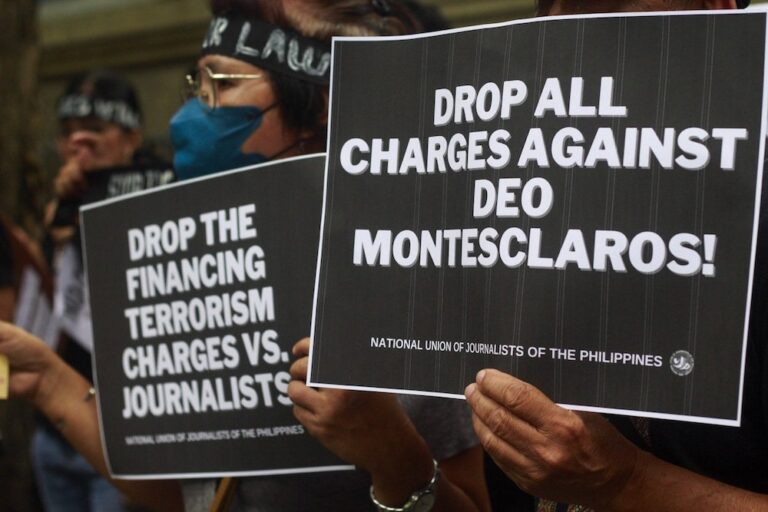(CMFR/IFEX) – President Gloria Macapagal Arroyo has issued an Executive Order (EO) that will restrict public and media access to official information. EO 608, issued on 20 April 2007, will create a National Security Clearance System that will “protect and ensure the integrity and sanctity” of classified information against “enemies of the state.” “It is […]
(CMFR/IFEX) – President Gloria Macapagal Arroyo has issued an Executive Order (EO) that will restrict public and media access to official information. EO 608, issued on 20 April 2007, will create a National Security Clearance System that will “protect and ensure the integrity and sanctity” of classified information against “enemies of the state.”
“It is the duty and responsibility of all government departments, agencies and offices to implement security measures that will protect and ensure the integrity and sanctity of classified or sensitive materials or information they have access to or in their possession,” the EO said.
Heads of government agencies with access to classified matters are directed by EO 608 to implement and institutionalize the security clearance procedure approved by the office of National Security Adviser Norberto Gonzales.
“Any unauthorized disclosure, sharing, publication or use of the information contained in the classified documents or materials shall be considered a grave offence and shall be punishable in accordance with civil service rules and regulations,” the EO said.
Departments are also ordered to designate a security officer who will assume responsibility for holding classified information.
Transparency and Accountability Network (TAN), a non-governmental organization that seeks to reduce corruption through transparency in the government, expressed alarm over EO 608.
“Through the passing of Executive Order 608, the President and her administration have shown their inclination towards confidentiality and secrecy,” said TAN Executive Director Vincent Lazatin. “This is probably a result of the government’s paranoia on sensitive issues.”
Lawyer Nepomuceno Malauan, co-convenor of the Access to Information Network, which has been working for the passage of a freedom of information act, also said that the EO “does not conform to any globally recognized standards of reasonable exception to access to information.”
Executive Secretary Eduardo Ermita, however, said that the Arroyo government is only concerned about national safety. But he specifically mentioned the opposition as a threat.
“When we deal with matters of security, all of us must be responsible enough in handling such information – and disinformation. And when I say ‘responsible enough,’ we should not just throw anything against the administration and use the sensitive information. So they (the opposition) should be discerning enough to know what are matters of national security especially that (sic) which pertain to the safety of our people and that’s the reason we are now quite strict in handling security matters,” Ermita said, in a report by the Manila newspaper “Daily Tribune”.
On 6 March Arroyo also signed an Anti-Terror Law, which will create an Anti-Terror Council given the task of deciding which groups are terrorist organisations, and proscribing them. On 12 March the UN Special Rapporteur asked the Philippine Congress to repeal this law given its non-compliance with international standards.


